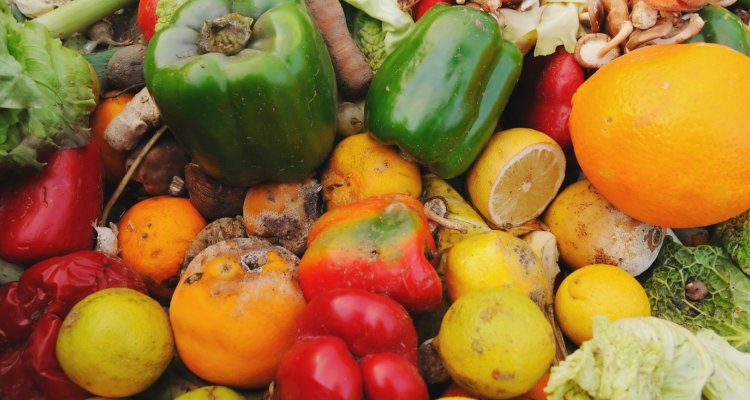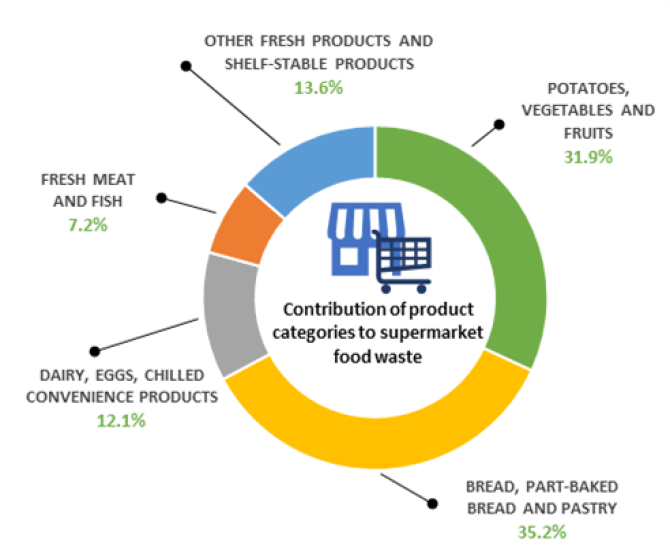
News
Less food waste in supermarkets
On average, 98.4% of all food and beverages available in Dutch supermarkets in 2020 was actually sold; the remaining 1.6% did not reach consumers (measured by weight in kilogrammes). That means 3.6% less food was wasted* by supermarkets than in 2018. These findings are based on research carried out by Wageningen University & Research (WUR) for Centraal Bureau Levensmiddelenhandel [Central Food Trade Office] (CBL) and the Ministry of Agriculture, Nature & Food Quality under the umbrella of the Samen Tegen Voedselverspilling [Food Waste Free United] foundation.
Five Dutch supermarket organisations participated in the project on the basis of self-reporting: Albert Heijn, Aldi, Jumbo, Lidl and PLUS. Together they represent almost 80% of the Dutch market.
The 1.6% of unsold products in supermarkets in 2020 were distributed across five product categories. The distribution was almost identical to the figures for 2018.

Food waste within the product categories
To take targeted measures against food waste, it is important to know the amount of waste in each product category. The proportion of unsold products in relation to stocked volumes per product category was as follows:
- bread, part baked bread and pastries: 7.8% (compared to 7.7% in 2018)
- fresh meat and fresh fish: 2.4% (2.9% in 2018)
- potatoes, vegetables and fruit: 2.4% (2.7% in 2018)
- dairy products, eggs and chilled ready-to-eat products: 1.2% (1.4% in 2018)
- other fresh and long-life products: 0.4% (0.4% in 2018)
Use of unsold products
*For the purposes of this research, ‘food waste’ refers to products that do not reach consumers. These waste streams are often used for other purposes, such as animal feed, fermentation and incineration. For example, two-thirds of unsold fresh bread, part baked bread and pastries are processed into high-grade animal feed.
Role of the supermarket in a waste-free supply chain
Despite higher sales in 2020 due to COVID-19, the amount of food wasted in 2020 clearly decreased compared to 2018. “This shows that the various waste-free initiatives taken by supermarket chains in 2019 and 2020 are bearing fruit,” says Toine Timmermans, director of the Food Waste Free United foundation. “Supermarkets play an important role in reducing food waste, not only individually but also as part of the supply chain, for example by making sustainable agreements with their suppliers, adapting quality standards, using new technologies and raising consumer awareness.”
Jennifer Muller, Sustainability Manager at CBL, is happy with the results of the self-reports: “Dutch supermarkets are still leading the way in this respect worldwide. The results of the research reveal which product categories can achieve the best results and this enables the supermarkets to work towards a sector-wide target: 50% less food waste by 2030.”
Food waste self-reports per sector
In 2020, Dutch supermarkets achieved a first when they made their food waste streams transparent. Thanks to this research, we now have a better understanding of food waste in the supermarket sector. The supermarket chains voluntarily self-reported their food waste and provided the anonymised data to WUR. WUR performed a data analysis and extrapolated the results to the entire Dutch market. Food Waste Free United is now working with WUR to analyse more links in the supply chain so that more targeted measures can be taken against food waste. More and more food chain sectors are participating in this research.
The research is an initiative of the CBL and part of the implementation agenda of the Food Waste Free United foundation. The research is carried out by Wageningen Food & Biobased Research and is funded by the Ministry
Food Waste Free United
The Food Waste Free United foundation is an ecosystem established to combine and accelerate all important initiatives and expertise for a waste-free Netherlands. In this initiative, companies throughout the entire supply chain, knowledge institutions, government bodies and social organisations are working together to achieve the United Nations Sustainable Development Goal 12.3: to reduce food loss and waste by half by 2030 (baseline 2015).
The foundation has developed a joint and systematic approach to reduce food waste in the Netherlands by 1 billion kilos annually, from farm to fork. The key organisations in the foundation are: Food Tech Brainport, Municipality of Meierijstad, Ministry of Agriculture, Nature and Food Quality, Province of Noord-Brabant, Rabobank, Dutch Nutrition Centre, and Wageningen University & Research. Our work is supported by Regio Deal Noordoost Brabant.
About the CBL
The CBL represents the interests of the supermarket sector and food service companies in the Netherlands. The food sector accounts for more than 10% of the Gross National Product. The supermarket sector employs over 300,000 people and is one of the largest employers in the Netherlands. Every day, four million consumers shop in supermarkets represented by the CBL.